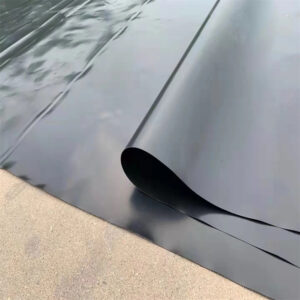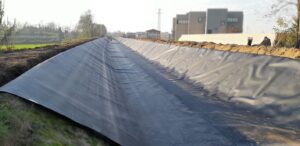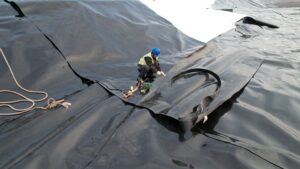Geomembrane is one of the essential materials for anti-seepage projects. Tinhy, as the leading research and development and sales organization of anti-seepage materials in China, has participated in more than 10,000 anti-seepage projects at home and abroad. Let’s talk briefly today, the general situation of anti-seepage projects what is the process like

What is the process of anti-seepage project?
1. Project planning and preparation stage:
Conduct feasibility study: evaluate the feasibility of the project, including geological conditions, pollution sources, environmental impact and resource requirements.
Determining goals: clarify the goals of the project, such as protecting groundwater quality, preventing environmental pollution, etc.
Fund raising and project approval: determine the budget of the project, raise the required funds, and obtain approval and project approval from the government or relevant institutions.
2. Geological survey and design stage:
Geological investigation: Through geological exploration and groundwater level monitoring, we can understand the geological structure, groundwater flow and existing pollution sources.
Engineering design: According to the geological survey results and project objectives, design a reasonable anti-seepage engineering plan, including the material, thickness and construction method of the anti-seepage layer.
Construction preparation stage:
Material preparation: Procure the required anti-seepage materials, such as anti-seepage membrane, anti-seepage soil, etc.
Site preparation: ensure that the construction area of the project is cleared, leveled, and carried out necessary lifting or compaction.
Equipment allocation: prepare the equipment and tools needed for construction, such as excavators, laying machines, etc.
3. Construction implementation stage:
Land leveling and clearing: Land leveling and clearing of the construction area, removal of obstacles and vegetation, to ensure the smooth progress of the construction.
Laying of anti-seepage materials: lay anti-seepage materials (such as anti-seepage membrane) on the surface or underground according to the design plan, cover the construction area, and ensure that there is no damage or leakage.
High treatment: If necessary, landfill or cover the anti-seepage layer to further improve the anti-seepage effect.
Monitoring system installation: According to needs, set up monitoring wells or monitoring equipment in the project area for subsequent monitoring of anti-seepage effect and water quality changes.
4. Post-management and maintenance stage:
Regular inspection and maintenance: Regularly check the integrity and leaks of the anti-seepage layer, and repair or replace damaged parts in time.
Water quality monitoring and anti-seepage effect evaluation: regularly monitor the water quality of groundwater or surface water, evaluate the effect of anti-seepage works, and make adjustments and improvements as needed.

What is the anti-seepage effect of geomembrane?
Prevent groundwater and pollutants from penetrating: Geomembrane is an anti-seepage material with high waterproof performance, which can effectively prevent groundwater and pollutants from penetrating from the ground to the soil or groundwater below. This can avoid the pollution of groundwater resources and the spread of pollutants, and protect the quality and sustainable use of groundwater.
Blocking the loss of soil particles: Geomembranes have high impermeability and can effectively block the loss of soil particles. In earthworks and soil and water conservation projects, the application of geomembrane can reduce soil erosion, prevent the soil in the construction area from being washed by wind and rain, maintain soil stability and protect the ecological environment.
Increase the structural strength of the project: The geomembrane has a certain tensile strength and puncture resistance, which can increase the structural strength of the project. For example, in the anti-seepage project of the landfill, the geomembrane can be used as the anti-seepage layer at the bottom of the landfill to withstand the weight and pressure of the garbage and protect the safety of groundwater.
Provide long-term stability of the project: The geomembrane has strong chemical corrosion resistance and aging resistance, and can be used stably for a long time under complex environmental conditions. It is not easy to be corroded by chemical substances and natural factors, which effectively prolongs the service life of the project and maintains the stability and safety of the project.
Author
-

Founded in 2002, Tinhy's team focuses on the manufacturing, marketing, installation, application and research and development of geosynthetic materials.
View all posts




